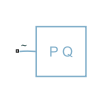Constant Power Load (Three-Phase)
Three-phase constant power load
Libraries:
Simscape /
Electrical /
Passive
Description
The Constant Power Load (Three-Phase) block implements a constant power load for a three-phase supply.
The block outputs a nominal rated power as long as the voltage from the three-phase supply is equal to or greater than the value specified for the Minimum supply voltage (phase-to-phase RMS) parameter.
When the voltage from the three-phase supply drops below the value of Minimum supply voltage (phase-to-phase RMS), the load behavior changes and the block models a load with constant impedance.
Equations
When the voltage from the three-phase supply is greater than the value specified for the Minimum supply voltage (phase-to-phase RMS) parameter, the block acts in constant PQ mode.
The active and reactive power are defined by:
where:
Vpk is the voltage peak magnitude.
is the phase of the current.
is the current peak magnitude.
During the first period, the peak current is equal to 0 A.
When the voltage from the three-phase supply is less than or equal to the value specified for the Minimum supply voltage (phase-to-phase RMS) parameter, the block acts in constant Z mode.
The active and reactive power are defined by:
where:
is the constant resistance.
is the constant reactance.
Vline RMSmin is the Minimum supply voltage (phase-to-phase RMS).
Load-Flow Analysis
If the block is in a network that is compatible with frequency-time simulation mode, you can perform a load-flow analysis on the network. A load-flow analysis provides steady-state values that you can use to initialize a machine.
For more information, see Perform a Load-Flow Analysis Using Simscape Electrical and Frequency and Time Simulation Mode.
Faults
To model a fault in the Constant Power Load (Three-Phase) block, in the Faults section, click Add fault next to the fault that you want to model. For more information about fault modeling, see Fault Behavior Modeling and Fault Triggering.
The Constant Power Load (Three-Phase) block allows you to model an electrical fault as an open circuit. The block can trigger fault events at a specific time.
